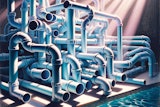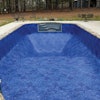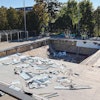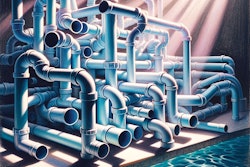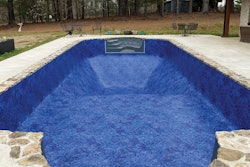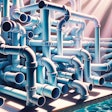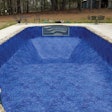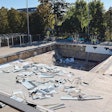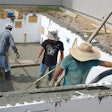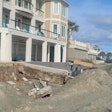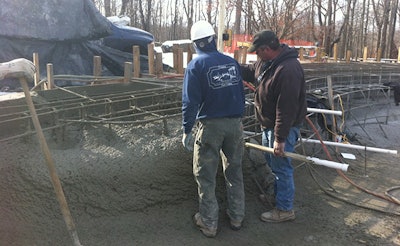
The jobsite foreman, a.k.a. superintendent, is arguably the most important person in the pool construction process, says custom builder William Drakeley. Part laborer, manager, troubleshooter and on-site answer man, the foreman is often the difference between a successful installation and one fraught with problems.
For those of us in the swimming pool construction business, you cannot overstate the importance of competent project management and oversight. Whether you build a handful of custom projects each year or hundreds of less expensive pools, whether you're a one-man show or run a company with staff, there is no getting around the fact that you need a true expert guiding the construction process.
Having the right person in the foreman role is as important as any other aspect of your business — if not more critical than most. After all, if you don't properly and reliably construct the pools themselves, all the snappy design, clever engineering, savvy marketing, sales prowess and self-promotion aren't worth much. Even the very best crews will make mistakes sometimes and the most motivated, well-intending worker will still require guidance.
For these reasons and a dozen others, a good jobsite foreman is worth his or her weight in gold. At our company, for example, we have a fantastic foreman, Dan LoRusso, who runs point on all our construction projects. Because we do only a dozen or so projects each year, Dan personally oversees each job with daily visits to almost every active site. In tangible ways almost too numerous to list, our success depends on the work and expertise of this consummate professional.
Certainly, companies that build larger numbers may need to find more than one competent foreman, but regardless of volume or project complexity, the basic need remains the same. For our part, our success greatly depends on Dan's skillset, temperament and ability to address problems quickly and effectively. As for the overall success of the industry at large, we cannot have too many people like Dan.
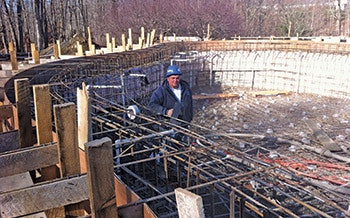
If you've been challenged by issues stemming from inadequate project management, here are some thoughts and observations that might help you find the right person (or persons) for the job.
JACK OF ALL TRADES
There is no question that quality foremen can be hard to find simply because they need to be good at a bunch of different things. The job requires an assertive yet patient temperament, a dogged work ethic, a knack for problem solving, an eye for detail and a working knowledge of each phase of the construction process, whether it is new construction or a renovation.
On the other hand, a foreman does not need to be up to speed on, say, water chemistry or maintenance routines, and they certainly do not need to wield the polished verbal skills of a salesman. A great foreman is rarely a fast talker, but is instead the kind of person that moves with quiet confidence and authority while being the smartest person in the conversation. He is someone people listen to and trust. He is a leader by example, often indirectly motivating his crews to work hard and smart to install an excellent product.
Your foreman should have a working knowledge of every facet of the construction process from laying out the initial excavation to coordinating the pool masonry. It's quite a list:
• Soils and geology: No one expects a foreman to be a soils scientist or a geotechnical engineer, but they do need to understand how soil conditions impact engineering and construction of structures that are subject to earth movement, soil expansion and groundwater, among other factors.
• Excavation: Ask anyone who has done it: there is more to digging a hole than some might think. Experienced foremen know how to operate excavators, front-end loaders and backhoes. They understand the parameters of the dig from the first shovelful. They are on sight to be sure the pool is dug per the plans, and they monitor on-site activity to prevent injuries and property damage. The foreman knows where to place the excavated soil so the material doesn't have to be moved more than once, saving the company time and cost.
• Forming: Great foremen should be capable carpenters who know how to build forms sturdy enough to withstand the force of the shotcrete or gunite application. They check and recheck dimensions so the vessel is being built per the plans and conforms to tight tolerances. If uncaught, mistakes made in the forming phase will echo through the rest of the project. A watchful foreman makes sure that doesn't happen.
• Structural steel: A foreman is familiar with the structural plan details and ensures that steel is installed to proper standards. (For example: minimizing steel congestion to prevent shadowing during the shotcrete or gunite shoot). The foreman is also watchful that steel is elevated from the floor with adequate clearance from the forms to allow for proper concrete coverage.
• Plumbing and hydraulics: Your foreman doesn't necessarily need to be able to design a hydraulic system, but they do need to understand the rational behind technical decisions behind the plan, such as pipe sizing, the need to eliminate unnecessary turns in the plumping loop and how to properly make all necessary connections.
• Shotcrete/gunite: During what is arguably the most important phase of pool installation, the foreman oversees all aspects of the shotcrete process, including use of the specified concrete mix, coordinating site logistics and monitoring shooting techniques. Our foreman, Dan, is an American Concrete Institute Certified Nozzleman and knows what it takes to make sure concrete is applied consistently and correctly. Ultimately, it is Dan who ensures that our pool shells meet or exceed the American Shotcrete Association's minimum standard of 4,000 PSI for concrete strength. And you can bet that, under his watchful eyes, rebound is never used in steps, benches or any other part of the pool.
To this list of disciplines, we can also add masonry, electricity, equipment installation, drainage and runoff, OSHA compliance and local/state code compliance. A foreman must be extremely proficient at reading plans and translating that information to the various trades. And of course, it doesn't hurt if they are handy with mathematics and calculus.
In addition to mastery of each of these specific areas of knowledge, the foreman has to understand how it all comes together — how the work of each trade impacts the next. They have to understand where to start digging, where to start forming, where to start placing the steel. They are the communicator and coordinator, ensuring that crewmembers are working in sync.
A good foreman is like a choreographer: he knows of all of the steps, is capable of doing each one himself, but also possesses the indispensable knowledge of how the entire production must come together.
PEOPLE SKILLS
In the hardscrabble world of construction, most of us don't tend to think in terms of interpersonal communication, diplomacy or accommodation. The fact is, pool construction is hard work, performed almost entirely by men who make their living with their muscles, bones and sinew. It's not a "touchy feely" environment, to say the least.
In that setting, a foreman's conduct should reflect a sense of personal authority and confidence. He is not afraid to address problems with technique, performance or behavior on the jobsite. Equipped with a strong psychological backbone, he is self-reliant.
By the same token, you don't want a tyrant who makes people nervous. A skilled foreman knows that motivated, happy workers are going to do a better job than those who are stressed, frustrated or angry. The foreman knows when to press an issue and when to step back. He also knows how to listen, collaborate with artisans and laborers and maximize on-site talent to solve problems.
Because foremen are on site and in charge, it is extremely common for homeowners to approach them with questions. Although client communication is not the foreman's primary function, it does help to have a person in place who is at ease talking to clients and answering questions as clearly and thoroughly as he can. I trust my foreman with client relationships completely and without exception.
THE RIGHT STUFF
With so much responsibility on the foreman's shoulders, naturally we all want to find the right person for the job. In my view, it is far more important to find someone with the right temperament and aptitude who can rise into the position than it is to find someone who has had direct experience in pool construction. In fact, it is in many ways better because you avoid having to unteach bad habits or methods that don't jive with your company philosophy and procedures.
I have worked with Dan for more than 25 years. Fifteen years ago, he joined my company as the foreman. He has worked in every single phase of the construction process — a key requisite for anyone in the foreman's role. Because it takes years to gain the necessary acumen, it is crucial to have some sort of line of succession in which there are others in the pipeline learning the details of pool construction. With each day on the jobsite, these people are growing more and more prepared to one day take up a foreman position.
There is a natural tendency to think that people with construction backgrounds are the best suited for the job. While that certainly is a favorable background, there is one profession that I think is even more ideal: farming.
Over the years, we've found that the best foremen have either worked on a farm or have been farmers themselves. The reason these hardworking souls make great foremen is simply that, through pure necessity, they have learned to be self-reliant, and their work involves a range of skills that in many cases have direct equivalents in our business.
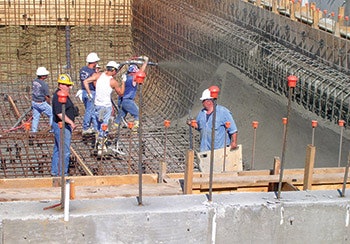
For instance, farmers are well-versed in operating and maintaining heavy equipment. They dig ponds and foundations and deforest land. They run plumbing lines for irrigation. Most are skilled at carpentry from raising barns and building fences, stables and the occasional chicken coup. They are industrious, thorough and appreciate a job well done.
It should come as no surprise that Dan grew up working on a farm.
REWARDING SUCCESS
Perhaps tougher than finding able foremen who meet these qualifications is keeping them. In talking with other pool builders, they often are concerned about training employees only to have them strike out on their own and become competitors.
My experience has taught me that this is not necessarily a huge concern if you do a couple of things right. First, because foremen are so important and so hard to find, they need to be paid a rate or salary (with regular increases when possible) that reflects their value to the company. A generous benefits package and personal use of company equipment as needed are also important measures that can let top employees know that they are valued. (To be sure, all of this really applies to any valuable employee.)
With regards to foremen, I've found that as a general rule, these are not the kind of people who necessarily want to start their own pool companies. A good foreman tends to be of the sort whose ambitions lie in achieving excellence — and achieving it often.
Yes, there will be exceptions, but if you are conscientious about hiring the right person and following through with training and commensurate pay and benefits, you'll very likely find that your foreman, rather than become a source of worry, will become an invaluable partner to you and the backbone of your business.
Comments or thoughts on this article? Please e-mail [email protected].
















